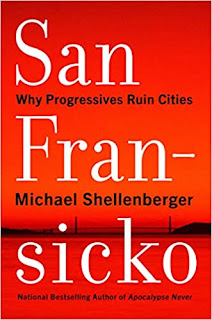Summerbook #13: San Fransicko
San Fransicko: How Progressives Ruin Cities, by Michael Shellenberger
Michael Shellenberger is, to put it mildly, a maverick. (And not the movie jet-flying kind!) He started off very left/progressive, became disillusioned with the results, and now advocates for nuclear power, water desalinization, and other solutions for West Coast problems. California recently had an election in which we voted whether or not to recall the current governor, Gavin Newsom, and if yes, who should be governor instead, and Shellenberger ran for the post. (Newsom didn't get recalled.)
Here, Shellenberger tackles the most obvious problem in San Francisco, as well as Portland, Seattle, and the rest of the West Coast -- including my own little city -- that of homeless addicts living on the streets. For years, we've poured billions into homelessness, only to see it getting worse and worse. This is partly because the problem in this case is not 'just' homelessness; we have shelters and programs and all sorts of things to address that. But we now have tent cities in which addicts openly commit violence/crimes and consume drugs, abuse any nearby people, and sometimes set fires. Overdoses are frequent (in my town, where fentanyl only arrived a couple of years ago, there seems to be a bad batch circulating and we've had 12 overdoses in less than a week), and people die.
A hodgepodge of services and organizations have grown up to address this, but on the West Coast the prevalent philosophy is harm reduction, which includes allowing people to commit crimes, deal drugs, and eventually kill themselves without getting arrested or sentenced to rehab. Activists tend to say that poverty and racism must be solved before addiction can be, and that the best solutions are to supply everything addicts need (food, needles, health care, housing) and give them rehab when they ask for it.
The result is, as just about everybody has realized by now, incredibly cruel. It is not kind to let people go untreated and/or die on the streets. It is not compassionate to allow vulnerable people to be exploited and abused by the strong. Businesses have closed because they can't absorb the costs of constant theft, citizens have their cars and homes invaded and are scared to go places, especially with children. (Here, the downtown area has suffered, and our nice bike paths are unusable.) Used needles, human feces, and trash cause environmental and safety problems. As Shellenberger notes, we are allowing people to do things that are incompatible with a working civil society.
Shellenberger tackles the many, complex aspects of this problem one at a time. I guess I'd say the big two are a) what to do about drug addiction, and b) how to care for the mentally ill. For addiction, Shellenberger looks to the cities that are 10-15 years ahead of us on this curve, such as Amsterdam. That was one of the first places to decriminalize drugs (this is different than legalization, it turns out), and they also got these same problems. The solution has been a combination of carrot and stick, not just one or the other. For one thing, you have to close down the open-air drug markets and shooting up, and make it just a little more difficult to buy and consume drugs; and you have to require addicts to go to rehab and take positive steps while you are giving them clean needles.
Then we need to require mentally ill people who cannot care for themselves to get treatment. Right now, we have this awful non-system that leaves people on the street or jails them, because people have to ask for treatment and there's a shortage of beds anyway.
Shellenberger relies on recommendations from many formerly homeless addicts who have lived on the streets and can now see what would have helped them, as well as experienced advocates who have worked on these issues for a long time but are not wedded to the party line. He's got a lot of good stuff to say, and much of it makes sense to the majority of citizens. Californians aren't happy about how this is being not-dealt with, but solutions are complicated and hampered by adherents to entrenched philosophies that refuse to acknowledge how their utopian ideals have backfired and made things worse.
I've probably gone on too long about all this, but these issues are front and center for us, so they're very interesting to me. All of this is a lot of why SF had fewer than 300 covid deaths, but over 700 deaths from overdoses in the same time period. It's why my own town has far more crime and violence than it used to. So I found Shellenberger to be a needed voice in this discussion, because we've been doing the same things since the early 90s and the problems have gotten worse, not better.





That is interesting. Seattle has changed so much since i lived there that I have no desire to go back. Progressive ideals can really be problematic when one is unwilling to admit they do not work in practice. This is one reason why I just don't know how change can come about through politics. Both sides seem entrenched in upholding their own ideas, defending and justifying themselves, and not in looking at the actual costs in human suffering. There can't be any progress without the willingness to admit mistakes.
ReplyDeleteYeah, we have to be willing to look at actual results and use them as information! I agree with you about the entrenched positions on all sides. It's incredibly damaging.
Delete